Stress
(Part 1) |
|

|
Understanding Stress
Most people think of stress as being under pressure.
But it's
really about
the conflict between what you perceive and how you react.
Acute stress
often results when time is short and demands are heavy.
Chronic stress
builds up over time. Some stress is normal. But too much
stress can have a negative effect on your mind and body. Fortunately, you can learn to manage stress.
|
Short-Term Stress
Short-term (acute) stress is caused by
anything that temporarily throws you
off balance. This can be something
as simple as a long line at the post office,
or locking your keys in your car.
Although the stressful feelings
can be very intense, they usually
go away after
a short time.
|

|
|
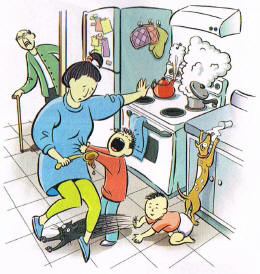
|
Long-Term Stress
Long-term (chronic) stress is constant,
unrelenting pressure. It can be caused
by managing a busy household, or caring
for an elderly parent. It can also result
from a lengthy illness, or a series of
taxing events. Long-term stress often
leaves you mentally and physically
drained. You may get the feeling the
stress will never end. Some people
even get so used to the stress that
they can't recognize it anymore.
|
|
Three Keys to Managing Stress
Some stress can be handled directly.
For instance, taking a
time management
class may help control a crazy work schedule.
But when you can't avoid stress,
three keys can help you gain
control. Recognize your reaction to stress,
identity your
sources of stress, and change the way you respond.
|
Recognize Your Reaction
Everyone's reaction to stress is different.
So the first step is learning how stress affects
you. Signs that you're under stress can be:
●
Physical
(sweating,
stomach in knots, headaches,
tight muscles, rapid heartbeat)
●
Mental
(worrying , feeling anxious, not being able
to focus, having a sense of doom)
●
Behavioral
(yelling, crying, becoming withdrawn,
eating too much or too little, drinking too much)
|
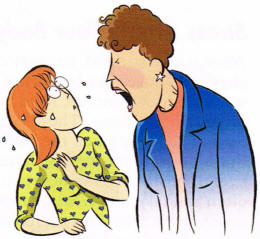
|
|

|
Identify Your
Sources of Stress
Sources of stress are called
stressors. They are unique
for each person.
Some of your stressors may be easy to spot,
like a tight deadline or a difficult boss.
But others may not be as obvious.
So when you feel yourself reacting
to stress, try to figure out what's
causing it. Once you identify your
stressors, it will
be easier to respond.
You can change the stressors.
Or, you
can change how
you respond to them.
|
Change Your Response
Changing your response is your most
powerful tool for combating stress.
Even when you can't avoid stressors,
you do have control over the way you
respond. There are many methods for
changing your response. With practice,
you can find one or more that work for you.
|
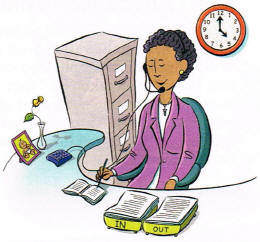
|
|
Recognizing Your Reaction to Stress
Each person's reaction to stress is
different. So it's important
to recognize your own stress profile. What are your body,
mind and actions telling you? Knowing how you react
to stress will help you learn to manage it. |
|
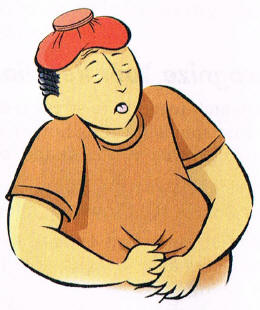
|
Stress Affects Your Body
When you're stressed, you may experience
physical changes like headaches, an upset
stomach, tense muscles, rapid heartbeat −even skin problems.
These symptoms
tend to go away when the stress is over.
But long-term stress can affect your
overall health. You may get sick more
often and take longer to recover.
It may even worsen other health
problems, such as high blood pressure.
|
Stress Affects Your Mind
Mental stress makes it hard to
concentrate. You may feel unfocused,
impatient or more emotional. You may
also have trouble sleeping. Instead of
counting sheep until you sleep, you may
be wide awake counting troubles. That's
because mental stress affects how you think
and feel.
You can get stuck in a loop of worry.
|
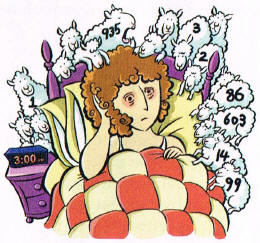
|
|
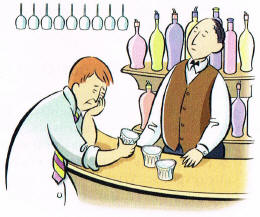
|
Stress Affects Your
Actions
Long-term stress can lead to negative
actions.
You might yell at your spouse
or withdraw from people who care about
you. It can also make you "shut down",
so you end up doing nothing at all.
Some people seek relief through
drinking, smoking or drug use,
which can create new problems.
|
|
Identifying Stressors
Once you learn your reactions to stress, it
gets easier
to identify what causes them.
Stressors can be everyday
events, major life changes or a combination of things.
They can also be both happy and sad. Knowing more
about stressors will help you find ways to manage stress. |
Minor Hassles
Daily life is filled with little annoyances.
Spilled milk,
lost keys, a missed phone call.
These are rarely earth-shattering events.
But the stress they cause can build up
over time. Minor hassles also seem more
painful if you're under
long-term stress.
Major Changes
Moving, a divorce, or the loss of a loved one,
are major changes. They require you to adapt
to a new lifestyle.
You may fear an unknown
future, or worry about whether you'll be able
to cope. Even positive events, like marriage
or the birth of a baby, can cause major stress.
Stress Overload
Being pulled in many directions
can be exhausting − especially when
you're juggling work and family.
Working late, taking kids to soccer,
paying bills and
buying groceries may
feel completely overwhelming.
For a
time, life can seem totally out of control.
Feeling Helpless
Feeling helpless is a sign of long-term
stress. You may feel like you have no control
over your life. Even a faraway disaster
told on the evening news may seem like it's
part of your own troubles. Over time, these
feelings may lead to depression. If you feel
"down"
for weeks, talk with your doctor
or a counselor. Depression can be treated.
|
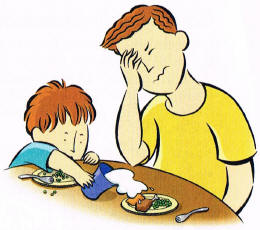
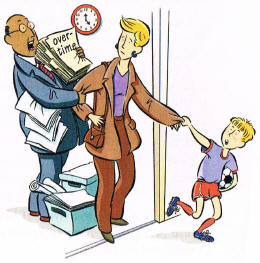
|
|
Top of Page |


![]()
![]()